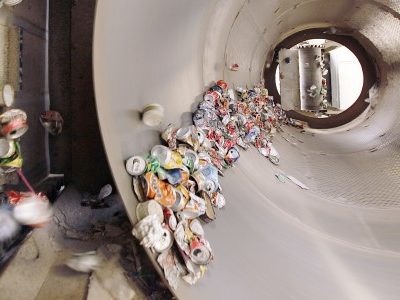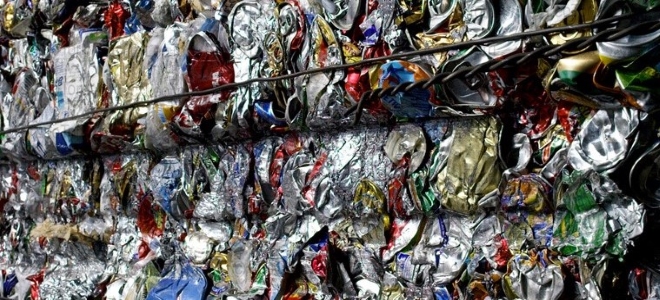MAKING A ROADMAP TO RECYCLING 100% OF CANS BY 2030.
OUR COUNTRY IS FIRST IN EUROPE IN THE RECYCLING OF ALUMINIUM PACKAGING.
In Italy, as much as 90.4% of aluminium beverage cans placed on the market is now recycled.
This has been measured by CIAL, the National Consortium that has been promoting the collection, recycling and recovery of aluminium packaging in Italy for around 25 years. The data highlight the validity and effectiveness of the national separate waste collection model that can achieve results in line with (or even better) than the results of countries that have adopted a deposit return scheme, which requires consumers to pay a small additional sum (included in the product’s price), refundable upon return of the packaging.
Strong but ductile, resistant but pliable, beautiful to look at and durable over time, aluminium is effectively a permanent material that is infinitely recyclable, as its structural properties are preserved forever.
In Italy, as in the rest of the world, aluminium cans are the most recycled beverage container ever.
The commitment is constant: CIAL has for some time shared with the producers and the main European aluminium packaging associations a roadmap to achieve 100% beverage can recycling by 2030. To this end, for years it has implemented collections dedicated only to beverage cans which, alongside traditional separate waste collection, guarantee their recovery in the places of greatest consumption, with an environmentally, socially and economically sustainable action strategy. One of the best examples is the can collection that started in 2007 on board the ships of some of the most important cruise companies.

All this under the hat of the “Every Can Counts” programme, which 19 European countries plus Brazil have joined to date.
The programme (on an ongoing basis) promotes the collection and recycling of cans in “on the go” situations and “outside the home” contexts, such as in parks, beaches, workplaces or during major cultural and sporting events.
In Italy, the project is known as “Ogni Lattina Vale” and is promoted by CIAL.
Over the years, CIAL has launched “extraordinary collections of cans” on numerous and different occasions, including events such as the Moto GP Grand Prix of Misano and Mugello, during the Carnival of Viareggio, major music festivals such as the Jova Beach Party and the Firenze Rocks or even in seaside resorts, as has occurred for three years on 100 beaches in Calabria, thanks to an agreement with the Region.

The Italian aluminium packaging supply chain is at the forefront in Europe and has long exceeded the objectives established at EU level. Italy’s records show it has one of the highest recycling rates at the lowest possible cost. Not surprisingly, the
environmental contribution paid by companies to encourage the collection and recycling of aluminium packaging is, at 7 Euro per ton, the lowest in Europe.
It is not just cans. Italy also confirms it is leading in the recycling of all the other components of aluminium packaging, such as spray cans, trays, tins, tubs, thin foil, tubes, caps and closures. For some years now, compared to the current legal targets (50% by 2025 and 60% by 2030), the overall recycling of aluminium packaging is around 70% at a national level.
The management system of this packaging waste is today an essential component of the Italian aluminium industry, which is characterised by production now based 100% on recycling. It is a true reference model for the entire world, consistent with the principles of the Circular Economy.
The recycling of 151,700 tonnes of aluminium packaging in the past three years avoided greenhouse emissions equal to 1,071 thousand tonnes of CO2 while saving the energy of 476 thousand tonne equivalents of oil.
In the last 20 years, the aluminium packaging sector in Italy and in the world has been characterised by constant evolution in terms of environmental protection.
An example can effectively help understand this. Thanks to research and technological development, the weight of a 33 cl beverage can has gone from 14g in 2000 to the current 12.2g, a 12% reduction. In terms of environmental protection, these are “very heavy” grams which, multiplied by the millions of cans produced each year, transform into tons saved in the production phase.
CIAL – National Consortium for Aluminium Packaging was founded in 1997 to foster the recycling and recovering of aluminium packaging at the end of its life cycle through separate waste collection by municipalities. The goal is to contribute to the recovery of a precious raw material, avoiding waste and protecting the environment. In this way, beverage cans, tins, trays, spray cans and thin aluminium sheet become fundamental and essential resources for sustainable and clean economic growth, just like the Italian recycling industry, which ranks among the top achievers in the world for its influential environmental performance. Respect for the environment, elimination of landfills and economic enhancement of reusable resources: these are some of the reasons why CIAL has been operating for more than 20 years in our country, for and on behalf of the companies in the consortium (producers and users of aluminium packaging, and recovery and recycling enterprises), promoting collection and recovery and raising awareness among millions of citizens in collaboration with public administrations.

